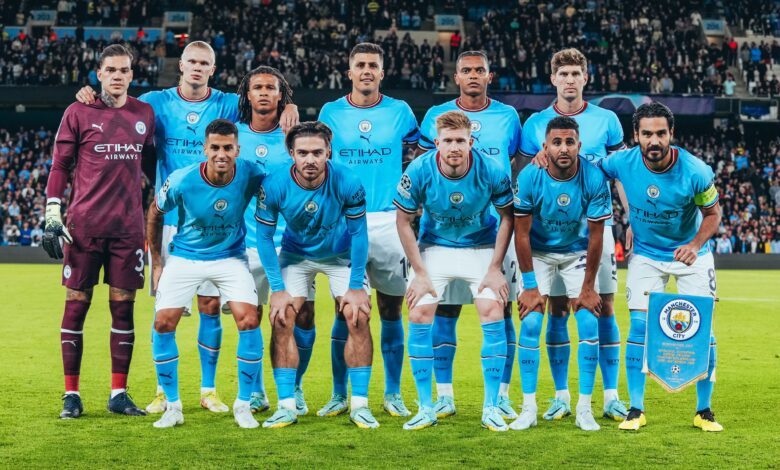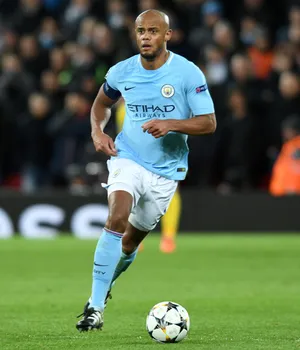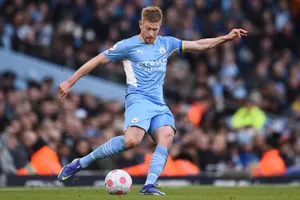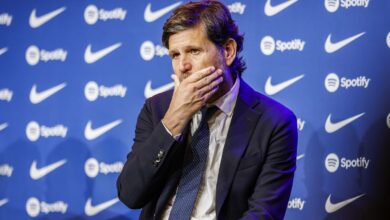Manchester City: History, Timeline, Honours And Records

Manchester City Football Club is an English football club based in Manchester that competes in the Premier League, the top division in the English football league system.
Manchester City FC, in full Manchester City Football Club, also called Man City or City, English men’s professional football (soccer) club based in Manchester. Manchester City achieved consistent top-division success and claimed multiple titles after Sheikh Mansour ibn Zayed Al Nahyan purchased a controlling share in the club in 2008.
Founding and early history
Manchester City traces its history to a football team founded in 1880 by members of St. Mark’s Church in Manchester. That team became Ardwick Association Football Club in 1887 and Manchester City Football Club (FC) in 1894. From 1894 to 2008 the club moved among the upper tiers of English football, regularly suffering relegation and winning promotion. It was champion of football’s second tier seven times, and it won the Football League First Division championship twice (in the 1936–37 and 1967–68 seasons). Manchester City also won the Football Association Challenge Cup (FA Cup) four times (1903–04, 1933–34, 1955–56, and 1968–69), the English League Cup twice (1969–70 and 1975–76), and the European Cup Winners’ Cup once (1969–70). Notable players from this era include Bert Trautmann, who was goalkeeper for Manchester City from 1949 to 1964, and midfielders Alan Oakes (played 1959–76) and Colin Bell (played 1966–79).
After winning back-to-back promotions following the 1998–99 and 1999–2000 seasons that enabled the club to ascend to English football’s top-tier English Premier League, Manchester City was once again relegated to the sport’s second tier after their lacklustre 2000–01 season. The club returned to the Premier League in 2002, however, and has remained there. In 2003 Manchester City moved from Maine Road, the stadium where it had played since 1923, to the City of Manchester Stadium (later also called Etihad Stadium).
2008 financial takeover
The Abu Dhabi United Group, owned by Sheikh Mansour ibn Zayed Al Nahyan, purchased a controlling stake in Manchester City FC in 2008 from Thaksin Shinawatra, a former prime minister of Thailand who had bought into the club in 2007. Mansour, a senior member of Abu Dhabi’s ruling family and one of the foremost businessmen of the United Arab Emirates, invested heavily, and the team’s performance soon improved. Manchester City won the FA Cup in 2011, its first major trophy since Mansour’s takeover. On the last day of the 2011–12 Premier League season, the team snatched the league title away from Manchester United on goal difference with the help of a stoppage time goal by Sergio Agüero against Queens Park Rangers FC. They won the Premier League again in 2013–14 and the English League Cup in 2013–14 and 2015–16.

After the appointment of manager Pep Guardiola in 2016, Manchester City expanded on their success. After a trophyless first season, the club set the all-time Premier League points record with 100 points as well as single-season Premier League records for goals scored and goal differential, among others, during their title-winning 2017–18 season. They repeated in 2018–19 and won the Premier League title again in 2020–21 and 2021–22. Manchester City won the FA Cup in 2018–19. The club was also the League Cup winner in 2017–18, 2018–19, 2019–20, and 2020–21. Manchester City reached the Champions League Final for the first time in its history during the 2020–21 season, though they lost to Chelsea FC. In 2021 Manchester City was the first club to withdraw from a controversial plan to form a new European Super League. Notable players who joined Manchester City in 2008 and afterward are centre back Vincent Kompany, midfielders Yaya Touré, David Silva, and Kevin De Bruyne, and forward Sergio Agüero.

The Manchester City Women’s Football Club was founded in 1988. Affiliated with Manchester United FC from its creation, the women’s team formalized its partnership with the men’s team in 2012 and entered the Women’s Super League in 2013.
Club Honours
Football League/Premier League Champions
1936/37, 1967/68, 2011/12, 2013/14, 2017/18, 2018/19, 2020/21, 2021/22
FA Women’s Super League Champions
2016
Football League/Premier League Runners-Up
1903/04, 1920/21, 1976/77, 2012/13, 2014/15, 2019/20
FA Women’s Super League Runners-Up
2015, 2017/18, 2018/19, 2019/20, 2020/21
FA Cup Winners
1903/04, 1933/34, 1955/56, 1968/69, 2010/11, 2018/19
Women’s FA Cup Winners
2017, 2018/19, 2019/20
FA Cup Runners-up
1925/26, 1932/33, 1954/55, 1980/81, 2012/13
Women’s FA Cup Runners-up
2021/22
League Cup Winners
1969/70, 1975/76, 2013/14, 2015/16, 2017/18, 2018/19, 2019/20, 2020/21
Continental Cup Winners
2014, 2016, 2018/19, 2021/22
League Cup Runners-up
1973/74
Continental Cup Runners-Up
2017/18
FA Community/Charity Shield Winners
1937/38, 1968/69, 1972/73, 2012/13, 2018/19, 2019/20
European Cup Winners’ Cup
1969/70
Champions League runners-up
2020/21
Premier League 2 Winners
2020/21, 2021/22, 2022/23
Reserve League Champions
1977/78, 1986/87, 1999/2000
FA Youth Cup Winners
1985/86, 2007/08, 2019/20
Under-18 Premier League National Champions
2020/21, 2021/22
Full Members Cup Runners-up
1898/99, 1902/03, 1909/10, 1927/28, 1946/47, 1965/66, 1985/86
Second Division/Division One/Championships Winners
2001/02
Division One Runners-Up
1999/2000
Division Two Play-Off Winners
1998/99
Division Two Runners-up
1895/96, 1950/51, 1988/89
Club Records
Highest appearance maker: Alan Oakes (680)
Club record goal-scorer: Sergio Aguero (260)
First club to win an English domestic treble: 2018/19 (plus 2018 FA Community/Charity Shield)
Most points in a season (2 for a win): 62 (Division Two, 1946/47)
Most points in a season (3 for a win): 100 (Premier League, 2017/18)
Most league goals in a season: 108 (Division Two, 1926/27: 42 games) and Division One (2001/02: 46 games)
Most goals in a season (all competitions): 169 (2018/19)
Most league goals by one player in a season: 38: Tommy Johnson (Division One, 1928/29)
Most wins in a row (all competitions) – English top-flight record: 21 (19 December 2020 – 2 March 2021)
Most league wins in a row: 18 (26 August – 27 December 2017)
Most Premier League wins in a row: 11 (equalling City’s previous record in 2017 and Chelsea’s of 2008)
Most home league wins in a row: 20 (5 March 2011 – 21 March 2012)
Most home wins in a row (all competitions): 20 (9 September 2017 – 4 March 2018)
Most away league wins in a row: 11 (21 May 2017 – 27 December 2017)
Most away wins in a row (all competitions): 19 (19 December 2020 – 1 May 2021)
Club record unbeaten run: 28 (27 April 2017 – 3 December 2017 and 25 November 2020 – 2 March 2021)
Club record unbeaten run away from home: 22 (5 November 2020 – 1 May 2021)
Premier League record for longest winning run of games in a calendar year: 13 (3 January – 2 March 2021)
Highest number of wins achieved in a single month in English football: 9: January 2021
Longest winning run by an English side in the Champions League: 7 (9 December 2020 – 4 May 2021)
Club record unbeaten home run in the Champions League: 14 (7 November 2018 – 4 May 2021)
Club record unbeaten run in the Champions League: 12 (21 October 2020 – 4 May 2021)
Most clean sheets in one season: 33 (61 matches, 2018/19)
Most clean sheets by an individual goalkeeper in one season: 29: Joe Hart (2010/11)
Most consecutive league clean sheets during a season: 6 (15 September 2018 – 29 October 2018)
Record league victory: 11–3 v Lincoln City, 23 March 1895
Record FA Cup victory: 12–0 v Liverpool Stanley, 4 October 1890
Record European victory: 7–0 v Schalke 04 (UEFA Champions League: Round of 16 second leg), 12 March 2019
Highest home attendance: 84,569 v Stoke City, 3 March 1934. (Record home attendance in English football)
Most capped player: David Silva (Spain)
TIMELINE
2000S
2000 City return to the Premiership following back-to-back promotions. A 4-1 victory over Blackburn at Ewood Park to seal promotion is followed by a celebratory pitch invasion by the Blues’ enormous travelling support.
2002 Future manager Stuart Pearce captains City as we are promoted back to the Premiership, breaking club records for the most goals scored and most points gained in a season along the way.
2003 It’s an emotional farewell to Maine Road as City’s home for 80 years stages its last football match, City vs. Southampton on Sunday 11th May. The club make the move to the impressive, 48,000 capacity, City of Manchester Stadium.
2007 Sven Goran Eriksson replaces Stuart Pearce as manager, and on 15th December City establish a ‘top flight’ club-record of nine straight home League wins at the start of the season.
2008 The Abu Dhabi United Group become the new owners of Manchester City. Former Wales, Barcelona, Bayern Munich and Manchester United star Mark Hughes becomes the new City Manager. The club break the British transfer record for the second time with the £32.5m signing of Robinho from Real Madrid.
2009 Roberto Mancini, former manager of Inter Milan replaces Mark Hughes in December.
2010 The Blues enjoy their best ever Premier League campaign, finishing 5th and qualifying for the Europa League in the process, as well as reaching the League Cup semi finals.
2011 The long wait for a trophy ends when the Blues beat Stoke 1-0 to lift the FA Cup, and qualify for the 2011/12 Champions League for the first time too!
2012 City win the League Championship for the first time in 44 years following a thrilling Premier League campaign. A last-gasp Sergio Aguero goal against QPR secures the title in the most dramatic of fashions at a jubilant Etihad Stadium.
2014 Manuel Pellegrini’s side clinch two trophies in one season for the first time since 1970, lifting the Capital One Cup and Premier League title. A 3-1 win over Sunderland at Wembley in March earns the Club’s first League Cup win since 1976 before the Blues go on to win the League Championship by two points.
2016 In February, City lift the League Cup for the second time in three seasons, winning a shootout against Liverpool following a 1-1 draw at Wembley. Willy Caballero saves three penalties in a row to clinch the third trophy of Manuel Pellegrini’s reign. Earlier in the same month it’s announced that Pep Guardiola will replace Pellegrini in the summer after agreeing a three-year contract with the Club.
2018: City beat Arsenal 3-0 to win the Carabao Cup at Wembley.
2018: City crowned Premier League champions for the fifth time after a record-breaking campaign under Pep Guardiola.
2019: City beat Chelsea on penalties to win Carabao Cup at Wembley.
2019: City beat Brighton and are confirmed as Premier League champions for the sixth time in the Club’s history.
2019: City win FA Cup with record-equalling 6-0 win over Watford
2020: City win third-successive League Cup with 2-1 win over Aston Villa.
2021: City secure a third Premier League title in four seasons, and also clinch a fourth successive League Cup triumph.
2022: After an epic battle with Liverpool, City claim a fourth Premier League title in five years with a dramatic last-day win over Aston Villa.
1990S
1992 The FA Premier League is formed, with City v QPR being the first ever live Monday night Sky game.
1994 City say farewell to the much loved Kippax Stand as legislation forces the closure of terracing at Premier League grounds. In its day the ‘Kippax’ was the largest standing area in the country.
1995/96 A dramatic season sees City appoint three different managers; Alan Ball, Steve Coppell and Frank Clark as well as significant spells as caretaker for Asa Hartford and Phil Neal.
1997 City unveil a new club badge. This new design features the Latin motto “Superbia in proelio” meaning ‘Pride in battle’.
1999 One of the most dramatic games ever played at Wembley sees City promoted after a penalty shoot-out against Gillingham in the Division Two Play-Off.
1980S
1981 City reach the 100th FA Cup final against Spurs. Following a 1-1 draw on the Saturday, a replay was played again at Wembley, regarded as one of the most entertaining Cup finals ever. City were narrowly defeated 3-2 following a famous Ricky Villa goal but for City fans, Steve Mackenzie’s 30 yard volley was the better strike.
1986 City play in the inaugural Full Members’ Cup final at Wembley before a crowd of 68,000.
1987 A club record 10-1 demolition of Huddersfield Town is recorded at Maine Road in 1987.
1989 City are promoted in dramatic style in the last game of the season at Bradford. The highest-ever Maine Road derby win is recorded with City thumping neighbours United 5-1.
1970S
1970 City complete a brilliant European and domestic cup double by winning the European Cup Winners Cup and the League Cup.
1972 The City badge is replaced with the red rose of Lancashire.
1974 City lose the League Cup final to Wovles.
1976 The Blues beat Newcastle United 2-1 at Wembley, with goals goals from Peter Barnes and a spectacular over-head kick from Dennis Tueart.
1979 The club break the transfer record, signing Steve Daley for £1,450,277. Within 2 years the Blues became the first side to sign three individual £1m+ players (Kevin Reeves & Trevor Francis were the other two).
1960S
1965 A new club badge is developed in 1965, based around the central part of the City of Manchester coat of arms.
1966 City are promoted as champions of Division Two, under the management team of Joe Mercer and Malcolm Allison.
1968 The Blues defeat Newcastle United on the final day of the season to clinch the League Championship for the second time.
1969 Manchester City beat Leicester City 1-0 at Wembley to win the FA Cup.
1950S
1955 City lose to Newcastle in the 1955 FA Cup Final at Wembley
1956 The Blues play their second successive FA Cup Final, this time beating Birmingham 3-1 to lift the trophy – their homecoming parade is the first outside transmission by Granada Television.
1958 The Munich Air Disaster devastates Manchester United’s first team squad and also kills several journalists including former City goalkeeper Frank Swift.
1945-50
1947 City are promoted as Champions of Division Two.
1949 The MCFC Official Supporters Club is formed.
1939 TO 1945 WORLD WAR 2
A Wartime League is set up with City playing in the Northern division. Substantial damage to Old Trafford means United are forced to play their home games at Maine Road. However City would never allow United usage of the home team changing room when the two teams met!
1930S
1934 After losing the final last year, City beat Portsmouth 2-1 to lift the FA Cup.
1934 A record provincial crowd of 84,569 is recorded at Maine Road when the Blues entertain Stoke City.
1937 Manchester City win the League Championship for the first time.
1920S
1920 City’s Hyde Road ground becomes the first provincial football stadium to be visited by a reigning monarch.
1923 After Hyde Road is destroyed by fire, the club moves to the 85,000 capacity Maine Road.
1926 A topsy-turvy year for the Blues – manager-less City become first Manchester side to play at Wembley (FA Cup runners-up), record the highest Manchester derby victory (6-1 at Old Trafford) and suffer relegation in the same season.
1928 City promoted as Champions of Division Two – and are the Football League’s best-supported club.
1914 TO 1918 WORLD WAR 1
League football is suspended from 1915-1919, though regional Subsidiary tournaments are still in place with City taking part in the Lancashire division.
1875 – 1910
1880 St Mark’s Church forms a football team which would later evolve into MCFC.
1884 The first known ‘City shirt’ is created – in black, with a Maltese-style cross. Some say this is because of the club’s strong links with Freemasonry in the 1880s, others believe the white cross proves the link with St Mark’s was still strong.
1887 St Mark’s team evolves into Ardwick AFC and moves to Hyde Road.
1889 An explosion at the nearby Hyde Road coal mine results in the death of 23 miners – Ardwick and Newton Heath play a friendly match under floodlights in aid of the disaster fund.
1892 The second division of the English Football League is created, with Ardwick AFC as founder members.
1894 Ardwick AFC reforms as Manchester City Football Club, in a bid to represent the whole city.
1889 City finish champions of Division Two, becoming the first team to gain automatic promotion.
1904 The Blues beat Bolton Wanderers in the FA Cup final at Crystal Palace, becoming the first Manchester side to win a major trophy.





